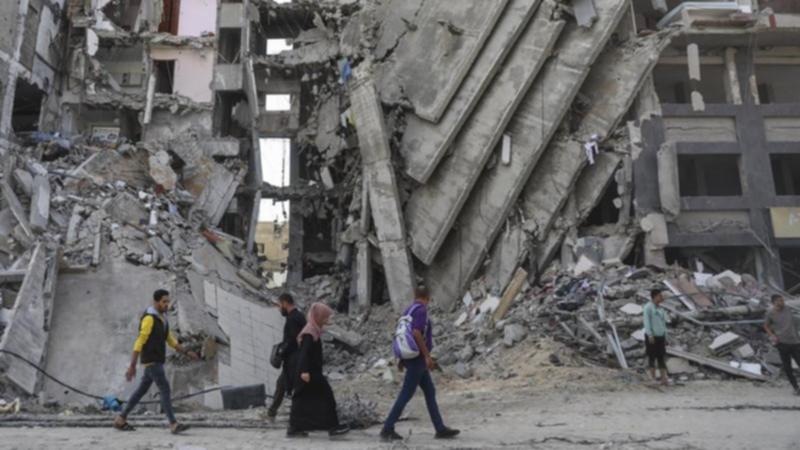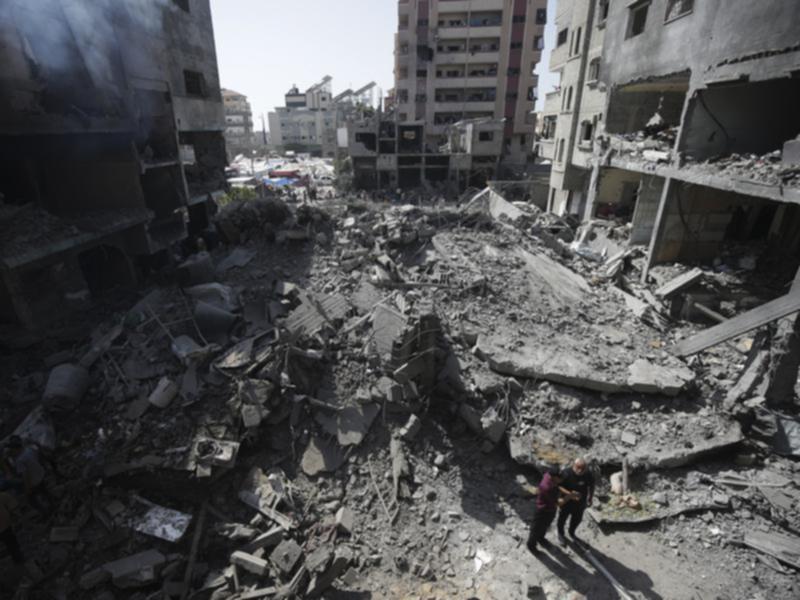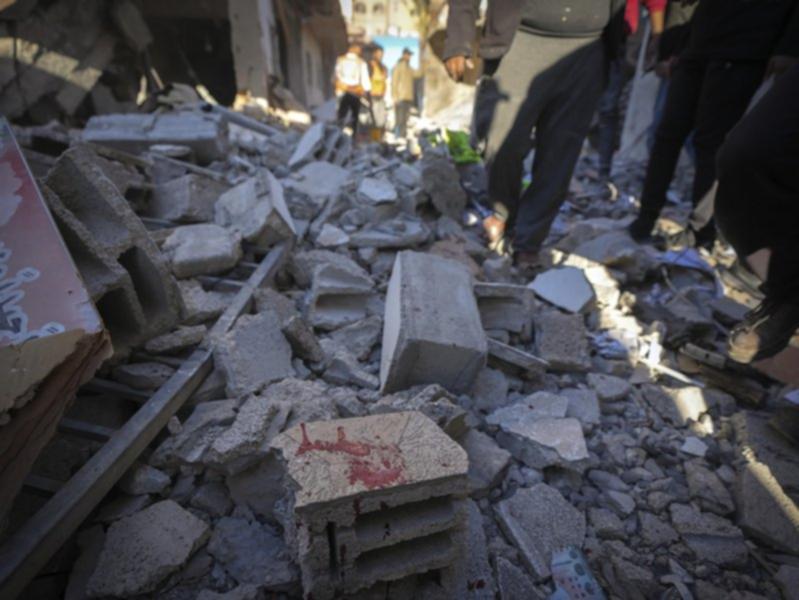THE WASHINGTON POST: Faced with mounting public anger, a weakened Hamas starts to compromise
THE WASHINGTON POST: With its military power depleted and its political influence on the wane, Hamas is under growing public pressure to help bring the war in Gaza to an end.

RAMALLAH, West Bank - With its military power depleted and its political influence on the wane, Hamas is under growing public pressure to help bring the war in Gaza to an end.
Palestinians in the besieged enclave are desperate for a ceasefire after 14 months of conflict, and many residents said they are increasingly fed up with the militant group as they struggle to survive hunger, displacement and Israeli attacks. Last week, Hamas publicly softened its negotiating position with Israel.
A new proposal for a 60-day pause in hostilities and the exchange of Israeli hostages for Palestinian prisoners includes key concessions from Hamas, which relented on its demands for a complete halt to the war and the full withdrawal of Israeli forces, a Hamas official told The Washington Post. The group is still insisting that displaced Palestinians be allowed to return to northern Gaza, the official said, speaking on the condition of anonymity because he was not authorized to talk to the media.
Sign up to The Nightly's newsletters.
Get the first look at the digital newspaper, curated daily stories and breaking headlines delivered to your inbox.
By continuing you agree to our Terms and Privacy Policy.As diplomats shuttle back and forth between Cairo and Doha, Qatar’s capital, to discuss the proposal, Egypt has been working separately to broker a postwar Gaza governance agreement between Hamas and its rival Fatah party, which controls the Palestinian Authority in the occupied West Bank.
Israeli Prime Minister Benjamin Netanyahu, under his own domestic pressures, has refused to put forward a “day-after” plan and has ruled out the return of the Palestinian Authority to Gaza, a key U.S. and Palestinian request. He has also rejected any role for the remnants of Hamas, saying Israel will keep fighting in Gaza until the Islamist movement has been eradicated. In the meantime, powerful members of Netanyahu’s far-right coalition are pushing to annex and resettle the enclave, and some have proposed expelling Palestinians by “encouraging voluntary immigration.”
Hamas, which has ruled Gaza for 17 years, is at its weakest point, according to residents, Palestinian officials and analysts, reduced to pockets of guerrilla fighters and increasingly incapable of governing. Even among supporters, anger is rising.
“There is a noticeable shift in public opinion,” said Rami, a Hamas member and government employee, speaking by phone on the condition that his last name and position be withheld for fear of retribution, both from Israel and from Hamas, which has brutally suppressed dissent. “There is now a strong desire to end the war at any cost.”
Even so, he said, “it is impossible to eliminate all of Hamas, as there is no viable alternative.”
A diminished force
Hamas seized power in Gaza in 2007, kicking out officials from the Western-backed Palestinian Authority after a bloody election dispute. Israel, along with Egypt, imposed a punishing land-and-sea blockade to weaken the group and contain its influence. Over the years, Israel and Hamas fought a series of short-lived wars.
Then, on Oct. 7 of last year, Hamas-led fighters invaded southern Israel, killing about 1,200 people, most of them civilians, and taking about 250 hostages back to Gaza. Israel’s retaliatory military campaign has destroyed much of the Palestinian enclave and killed more than 45,000 people, according to the Gaza Health Ministry, which says that thousands of bodies remain uncounted beneath the rubble and that women and children account for two-thirds of the dead.
Netanyahu said Thursday, without providing evidence, that the Israel Defense Forces had killed “close to 20,000” Hamas fighters. In late July, Israel assassinated Hamas political leader Ismail Haniyeh in a covert operation in Iran; military leader Yahya Sinwar, believed to the primary architect of the Oct. 7 attacks, was killed by Israeli forces in southern Gaza in October.
“Hamas’s [military] capabilities have been depleted,” said Tahani Mustafa, senior Palestine analyst at the International Crisis Group, but it “has shown that it has the capacity to maintain a long-term insurgency.” Even in its weakened state, Hamas has continued to ambush Israeli soldiers and launch occasional homemade projectiles into southern Israel.
Despite mounting local disillusionment, the militant group has also been able to recruit new fighters, said Mustafa, “not because of adherence to Hamas’s ideology” but because Israel has “decimated everything around them.”
Israeli strikes have also killed government ministers, local officials, police officers and other civil employees of the Hamas-led government, further sapping the group’s ability to wield influence on the ground. The IDF has denied targeting civilians.
Signs of Hamas governance remain strongest in the crowded central cities of Deir al-Balah, Khan Younis and Nuseirat, where hundreds of thousands of displaced Gazans have taken refuge. The Hamas police force, Social Development Ministry and emergency committees still provide some services, residents said, adding that Hamas has continued to pay government salaries amounting to several hundred dollars every few months.

But in Rafah, the enclave’s southernmost city, armed gangs opposed to Hamas have effectively taken control and are looting aid trucks in Israeli-controlled areas - severely complicating the delivery of humanitarian relief and deepening Gaza’s hunger crisis.
Hamas has tried to impose limited price controls throughout the war, but residents say the cost of goods has skyrocketed amid widespread shortages. A 25-kilogram bag of flour, which cost $14 before the war, can now go for upwards of $250, residents said.
Last month, Hamas began a campaign against the looters. “We will deal firmly and strictly with merchants and sellers cooperating with these lackeys of the occupation,” read a message sent by a group affiliated with the Hamas’s security forces. On Nov. 18, armed men associated with Hamas attacked one of the leaders of the criminal gangs, Yasser Abu Shabab, and killed at least 10 people, including his brother, Abu Shabab told The Post.
Yet the looting has continued, and inflation is soaring unchecked.
“We are living through a catastrophe,” said Rami, the Hamas government employee. “Israel’s actions are undeniably criminal, but Hamas’s poor judgment and failure to account for the war’s aftermath have also contributed significantly to this disaster.”
Hamas continues to turn its violence on the few Palestinians willing to speak out against it. In July, Hamas critic Amin Abed, 35, was beaten by masked men he told The Post were sent by the group. Abed was so badly injured that he needed medical care abroad.
On Dec. 6, a masked man fatally shot another longtime political critic, Ziad Abu Hayya, as he was returning from the market, his daughter Amira told The Post, blaming Hamas for his killing. He had been beaten and threatened repeatedly over the years.
Amira, 28, said she and her surviving family members have received menacing phone calls and now fear for their own lives.
A Hamas spokesperson did not respond to a request for comment on the beating of Abed or the shooting of Abu Hayya and the harassment of his relatives.
The political void
While its public statements remain defiant, Hamas has quietly begun to soften its hard-line demands, revealing a new willingness to compromise after months of deadlocked peace talks.
On Friday, Hamas gave Israel, through Egyptian intermediaries, the names of living hostages - a long-sought goodwill gesture meant to pave the way to a ceasefire, according to a former Egyptian official with knowledge of the negotiations, speaking on the condition of anonymity to discuss sensitive diplomacy.
“I think there’s a big debate in Hamas now on … how it can survive for the future,” Mousa Hadid, the deputy chairman of the Palestinian National Council in Ramallah, told The Post, predicting that this would lead to “more pragmatic” leadership.
“But it’s not logical to talk only about a ceasefire,” he said. “What about the West Bank? What about Jerusalem? What about the future of the [Palestinian Authority]? … We must have a deal with everything.”
Some in Gaza, including former members of Hamas’s political base, want to be free of the group’s rule.
“I believe Hamas will relinquish power after the war … and I will not accept Hamas remaining in power,” Nariman, 28, said by phone from Nuseirat, speaking on the condition that only her first name be used for fear of retribution.
She said that her family has long supported Hamas and that her brother was killed fighting for the group in December. But she said they are now convinced that Gazans “need to explore alternative governance.”

Recent polling suggests her family is not alone: A September poll by the Ramallah-based Palestinian Center for Policy and Survey Research found that 39 percent of people in Gaza were satisfied with Hamas’s performance, down from 64 percent in June.
Yet as fears mount of a long-term Israeli military occupation of Gaza, some Palestinians have a “sort of despair and hope that at least Hamas can maintain a long enough insurgency to make it costly for the IDF to stay,” said Muhammad Shehada, a visiting fellow at the European Council on Foreign Relations.
Analysts said the group is trying to acknowledge the public backlash while continuing to position itself as the only viable face of resistance against Israel.
“There are members within Hamas who openly criticize the ongoing situation and demand an end to the war at any cost, which is a natural response to the immense suffering caused by the war,” Ibrahim Al-Madhoun, a political analyst aligned with Hamas, said from Turkey.
Yet “the group remains confident that once the war ends, many opinions and perspectives will shift,” he said.
Tamer Qarmout, a Gazan professor of public policy at the Doha Institute for Graduate Studies, said that “Hamas realizes that it will be out of the governance picture for a long time,” but it will remain entrenched as “an idea, an ideology, an active political party in Palestinian mainstream politics.”
As long as the war continues, Qarmout said, no amount of public frustration can force political change in Gaza.
“If the Israelis expect that Palestinians somehow by miracle will rise up and rebel against Hamas while this massacring is continuing, it’s nonsensical,” he said. “There are no other alternatives.”
---
Balousha reported from Toronto. Hajar Harb in London and Claire Parker in Cairo contributed to this report.
© 2024 , The Washington Post
